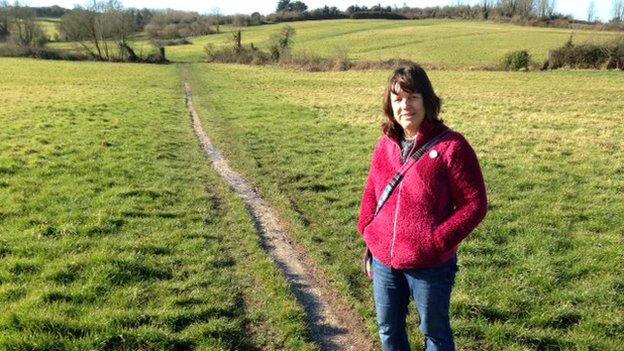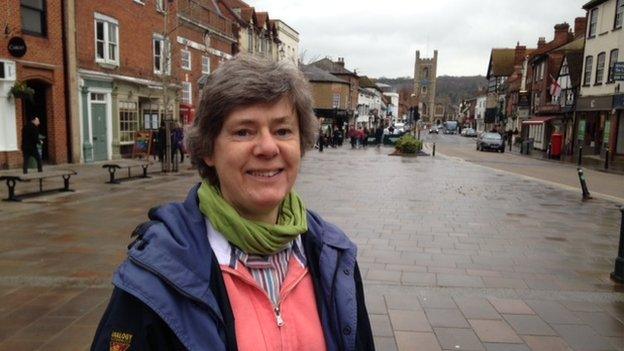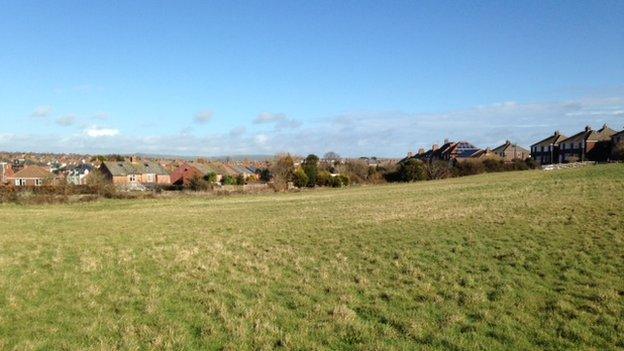Village green fears after Supreme Court ruling
- Published

Gill Taylor went to the Supreme Court to stop development of Curtis Fields in Weymouth
Campaigners fear some town and village greens could be under threat, after a Supreme Court ruling last month stripped two open spaces of their official status.
Curtis Fields in Weymouth, Dorset, and Clayton Fields in West Yorkshire were both taken off the village green list after the court found problems with the way they were registered.
The ruling presents no immediate threat to the traditional English greens of popular imagination - many with cricket pitches, oak trees and country pubs.
Most of these classic and quintessentially English spaces were registered long before 1970 when the rules changed.
However, the judgement, external might affect those greens added more recently.
Many wouldn't fit the traditional image of a town green at all. Some are open fields at the back of housing estates, others are scrappy bits of land on the side of railway tracks.
'Abusing' legislation
But if local people can show that they have been using this land continuously over the past 20 years, then they have the opportunity to register the land as an official "green". This offers the highest protection against development.
House builders say some campaign groups have been using the process simply to thwart builders.
"It's not an epidemic but there have been a significant number of groups abusing the legislation merely to stop development on that site," said Andrew Whitaker, of the Home Builders Federation.
After intensive lobbying by the house-building industry, the law was changed last year.
The regulations were significantly tightened so that an attempt to register a green cannot be considered when somebody has made a planning application, or a local development plan is being produced.

Kate Ashbrook, of the Open Spaces Society, says people protecting green spaces are being "squeezed"
That was a setback for the Open Spaces Society, which has been trying to protect greens for almost 150 years.
"We are now being squeezed on both sides," said Kate Ashbrook, who runs the society.
"The government is squeezing us by saying land under planning threat cannot be registered. But the Supreme Court is also saying that you might be able to de-register a green that's already on the list."
The battle over Curtis Fields in Weymouth has been going on for several years.
It was registered as a town green in 2001, and then bought by local house-builder Betterment Properties in 2005.

Betterment Properties plans to build 180 homes on part of Curtis Fields over the next five or six years
Its status has been the subject of numerous court cases ending with the Supreme Court ruling which went against local campaigners.
Gill Taylor, of the Society for the Protection of Markham and Little Francis, which took the case to the Supreme Court, said: "I was really disappointed not only for our green but for greens across the country and for other pieces of land that are based on a registration, because it makes you wonder what the value of registration is."
She says the developer will now be able to decide what happens to the land.
Betterment Properties confirmed that it wanted to build 180 houses on part of the area over the next five or six years.
The business says it spent more than £1m on the legal case, and is now keen to see an end to years of delay.

Mervyn Stewksbury said the Curtis Fields development would benefit the people of Weymouth
"This was just an open field and has been described as the biggest dogs' toilet in the town," said Betterment chairman Mervyn Stewksbury.
"The residents of Weymouth will not lose.
"Instead of having rough fields with grass two foot high, they will have beautifully cut lawns with large open spaces so I can guarantee at the end people will say, 'Yes this is much better than we had before.'"
The recent Supreme Court case may provide some encouragement to house builders in other parts of the country, where village green status is being questioned.
But the long legal dispute also shows how hard a community will battle for the right to call its space a "green".
- Published5 February 2014
- Published15 January 2014
- Published13 January 2014